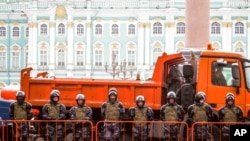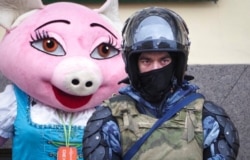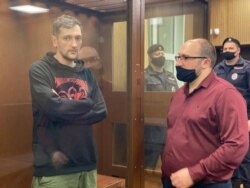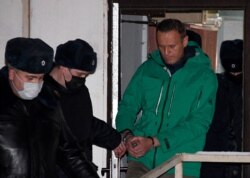Russian police have issued a strong warning against participating in protests planned for Sunday to call for the release of jailed opposition leader Alexei Navalny, the Kremlin's most prominent foe.
The warning came amid detentions of Navalny associates and opposition journalists and a police plan to restrict movement Sunday in the center of Moscow.
Navalny was arrested January 17 after flying back to Russia from Germany, where he had spent five months recovering from nerve-agent poisoning. His detention sparked nationwide protests one week ago in about 100 cities; nearly 4,000 people were reported arrested.
The next demonstration in Moscow is planned for Lubyanka Square. The Federal Security Service, which Navalny claims arranged to have him poisoned with a Soviet-era nerve agent on behalf of the Kremlin, is headquartered in the square. The Russian government has denied a role in the 44-year-old's poisoning.
The city police department said much of central Moscow from Red Square to Lubyanka would have pedestrian restrictions and that seven subway stations in the vicinity would be closed Sunday. Restaurants in the area also are to be closed, and the iconic GUM department store on Red Square said it would open only in the evening.
Russian Interior Ministry spokeswoman Irina Volk cited the coronavirus pandemic in a Saturday warning against protests. She said participants found in violation of epidemiological regulations could face criminal charges.
The January 23 protests in support of Navalny were the largest and most widespread seen in Russia in many years, and authorities sought to prevent a repeat. Police conducted a series of raids this week at apartments and offices of Navalny's family, associates and anti-corruption organization.
His brother Oleg, top aide Lyubov Sobol and three other people were put under two-month house arrest Friday, as part of a criminal probe into alleged violations of coronavirus regulations during last weekend's protests.
Sergei Smirnov, editor of the Mediazona news site that was founded by members of the Pussy Riot punk collective, was detained by police Saturday as he was leaving his home. No charges against him were announced.
Navalny fell into a coma August 20 while on a domestic flight from Siberia to Moscow. He was transferred to a Berlin hospital two days later. Labs in Germany, France and Sweden, and tests by the Organization for the Prohibition of Chemical Weapons, established that he had been exposed to the Novichok nerve agent.
Russian authorities have refused to open a full-fledged criminal inquiry, citing a lack of evidence that he was poisoned.
Navalny was arrested when he returned to Russia on the ground that his months recovering in Germany violated terms of a suspended sentence he received in a 2014 conviction for fraud and money laundering, a case that he says was politically motivated.
Just after the arrest, Navalny's team released a two-hour video on his YouTube channel about a lavish Black Sea residence purportedly built for Russian President Vladimir Putin. The property features amenities like an "aqua-discotheque," a hookah lounge equipped for watching pole dancing and a casino. The video has been viewed more than 100 million times and inspired a stream of sarcastic jokes on the internet.
Putin has said that neither he nor any of his close relatives owns the property, and the Kremlin has insisted it has no relation to the president even though it's protected by the federal bodyguard agency FSO, which provides security for top government officials.
Russian state television later aired a report from the compound that showed it under construction and included an interview with an engineer who claimed the building would be a luxury hotel.
On Saturday, construction magnate Arkady Rotenberg, a close Putin associate and his occasional judo sparring partner, claimed he owned the property.







